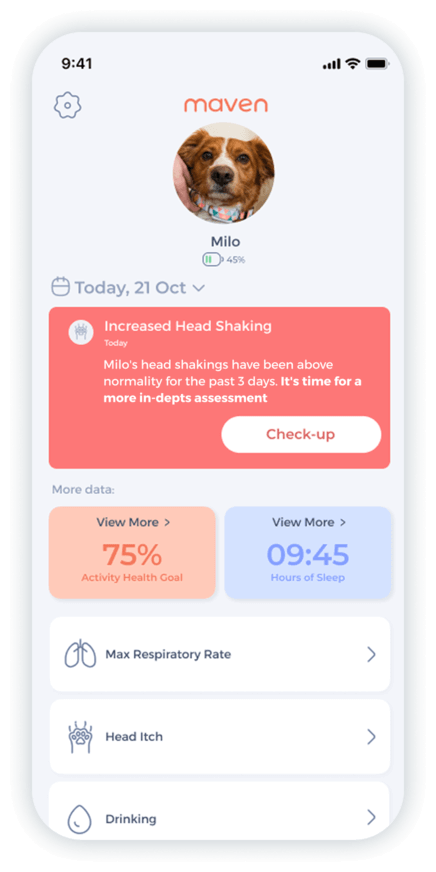Stress Colitis in Dogs: Symptoms, Treatment & Recovery (Vet Verified)
Dogs can be under stress, just like humans. In fact, it can cause digestive issues just the same. Stress colitis in dogs is one of the main culprits for large bowel diarrhea in dogs. Join us for a full breakdown of dog stress colitis, how to spot it, and the most effective ways to treat it.
Key takeaways:
- Stress colitis in dogs is a short-term inflammation of the colon triggered by stress.
- Common causes include travel, boarding, loud noises, or major life changes.
- Symptoms often include diarrhea, straining, and the presence of mucus or blood in the stool.
- Most cases resolve within a few days with rest, hydration, and a bland diet.
- Vet care is important if symptoms persist or dehydration develops.
What Is Stress Colitis in Dogs?

Stress colitis in dogs is an inflammation of the large intestine that occurs when anxiety and adrenaline mess up the normal digestion. It can be triggered by basically any significant or insignificant change, ranging from a thunderstorm to moving to a new place.
Stress can alter blood flow and disrupt the balance of healthy bacteria in the gut. This can cause the colon to become irritated and less efficient at absorbing water. The result? Diarrhea, sometimes with a bit of fresh blood, and more frequent trips to the bathroom.
Common Causes of Colitis in Dogs from Stress
Even the slightest change can have a negative impact on your dog’s health, and we are talking about things as simple as a kennel stay. Here are some of the most common triggers behind colitis in dogs from stress:
- Loud noises: Thunderstorms, fireworks, or construction noise can spike anxiety and trigger stress colitis in dogs within hours.
- Vet visits or grooming appointments – Even well-handled appointments can cause stress-related digestive upset in sensitive pups.
- Major life changes: Things such as moving houses, changes in the owner’s work schedule, or losing a companion (human or animal) can all contribute to chronic stress.
- New people or pets in the home: Dogs are creatures of habit, and we can relate. A new roommate, baby, or animal can shake up their sense of stability.
- Travel and routine changes: New environments, disrupted schedules, or long car rides can upset both the mind and the gut.
Anything that elevates a dog’s stress hormones can set off colitis in dogs from stress. It’s crucial to stay vigilant and even employ a pet health tracker to be proactive, spot any incoming changes, and keep the dog’s gut running smoothly.
How to Recognize Symptoms
When colitis in dogs from stress takes hold, the changes in your dog’s stool or bathroom habits are a telltale. Here’s what to watch for if you suspect your dog’s gut is reacting to stress:
- Loose or watery stools
- Frequent bowel movements
- Straining during defecation
- Small amounts of stool
- Mild abdominal discomfort
- Possible dehydration
- Low energy
- Stool with traces of blood
If the diarrhea and other symptoms persist, worsen, or are accompanied by vomiting or lethargy, that’s your cue to call the vet.
“I got the Maven sensor for my 14-year-old Chihuahua mix with heart and trachea issues. It gave me back peace of mind – I can track her RRR, BPM, drinking, and activity anytime and know instantly if something’s wrong. Highly recommend!”

★★★★★
Chiara De Luca
Titti
How Long Does Stress Colitis Last in Dogs?
Stress colitis in dogs clears up within three to five days, especially once the stressful event has passed and your dog’s routine is back to normal. Some mild cases can even resolve within 24 hours, while others may take a bit longer to subside.
The rule of thumb here is to reach out to the vet if the symptoms last for more than five days, especially if they are accompanied by dehydration.
Is Stress Colitis in Dogs Deadly?
No, stress colitis in dogs is rarely deadly. In fact, it takes up to five days of rest, hydration, and proper nourishment for the symptoms to go away. That said, stress colitis can become serious if it’s prolonged or if dehydration sets in.
Chronic or severe diarrhea can quickly drain fluids and electrolytes, which is where the real danger lies. Additionally, if blood is present in the stool, it’s a good idea to seek professional help and contact a veterinarian.
How to Treat Stress Colitis in Dogs

“Stress colitis is one of the most common causes of temporary diarrhea in dogs. It’s usually not serious, but early care and stress management make all the difference.” — Carolina Domingues, DVM, Veterinarian at Maven Pet
The treatment of colitis depends on the cause, and with stress colitis, it’s the support that counts the most. Here’s how you can provide it:
- Reduce the stress as much as possible
- Give your dog bland food low in fat
- Keep the water fresh at all times
- Introduce probiotics to help restore the gut bacteria
- Gradually return to regular food
- Get help from your vet
When it comes to treating stress colitis in dogs, think comfort, calmness, and consistency. Most dogs recover beautifully with a bit of TLC and a steady hand guiding them back to their usual selves.
How the Maven Pet Health Monitor Helps Track Stress-Related Health Changes
To pick up on stress colitis in dogs, it’s vital to keep an eye out for subtle changes in your dog’s activity or rest patterns that often show up before the messy symptoms do. This is where Maven Pet’s pet health tracker comes to the stage.


Monitor heart rate, respiratory rate, activity & rest, drinking, itch behavior.
It tracks subtle shifts in your dog’s activity and rest. The lightweight collar sensor continuously captures your dog’s movements and translates them into clear, simple events like “Adventure” or “Rest Break.”
Maven’s dog health tracker does weekly and monthly comparisons to show what’s normal for your dog and what’s different. If playtime suddenly drops or rest increases after a stressful event, that change can point to developing colitis from stress even before symptoms appear.
Conclusion
To any pet parent, stress colitis may look alarming, but it’s usually your dog’s way of saying their system needs a breather. With calm care, steady routines, and a watchful eye, most dogs recover quickly and comfortably from it, with zero consequences. What you can do is keep an eye on patterns, use a smart pet health app like Maven to spot early signs of stress, and never hesitate to consult your vet when you think professional care is warranted.
Maven Pet focuses on improving the quality of life of our pets with technology, using artificial intelligence (AI) to enable proactive pet care. By accurately collecting and monitoring pet data 24/7 and flagging any irregularities, Maven Pet empowers pet parents and veterinarians to stay ahead of potential health issues, ensuring the well-being and longevity of our beloved companions.




